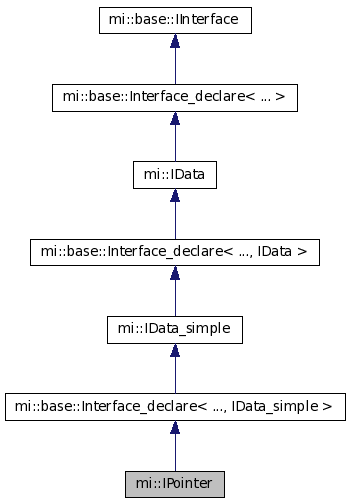mi::IPointer Class Reference
[Simple Types]
Description
This interface represents mutable pointers. Mutable pointers in the sense of this interface are mutable interface pointers, not void* pointers.
Pointers are either typed or untyped. Typed pointers enforce the target to be of a certain type derived from mi::IData. The type name of a typed mutable pointer is "Pointer<", followed by the type name of the target, and finally ">", e.g., "Pointer<Sint32>" for a mutable pointer to an instance of mi::ISint32.
Untyped pointers simply store a mutable pointer of type mi::base::IInterface. The type name of an untyped mutable pointer is "Pointer<Interface>".
The additional level of indirection can be used to use mutable interface pointers with data collections while maintaining const correctness. E.g., the getters of mi::IData_collection, mi::IArray, mi::IDynamic_array, and mi::IMap return const interface pointers if the instance itself is const. If you want to retrieve a mutable interface pointer from such a collection you have to wrap it in an instance of mi::IPointer before you store it. When you retrieve it from the const collection, you can call get_pointer() to obtain the wrapped mutable interface pointer.
See also:
Public Member Functions
- virtual base::IInterface* get_pointer() const =0
- Returns the pointer.
- template< class T>T* get_pointer() const
- Returns the pointer. More...
- virtual Sint32 set_pointer( base::IInterface* pointer) =0
- Sets the pointer. More...
Member Functions
- virtual base::IInterface* mi::IPointer::get_pointer() const [pure virtual]
-
Returns the pointer.
-
template< class T>
T* mi::IPointer::get_pointer() const [inline] -
Returns the pointer. This templated member function is a wrapper of the non-template variant for the user's convenience. It eliminates the need to call mi::base::IInterface::get_interface( const Uuid&) on the returned pointer, since the return type already is a pointer to the type T specified as template parameter.
- virtual Sint32 mi::IPointer::set_pointer( base::IInterface* pointer) [pure virtual]
-
Sets the pointer. Note that a NULL pointer is a valid parameter value that clears the previously set pointer. Subsequent get_pointer() calls will return NULL then.
Returns
- 0: Success.
- -1: pointer has the wrong type.



